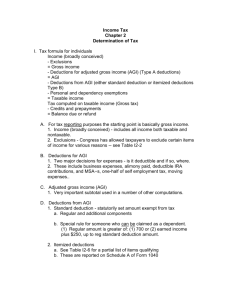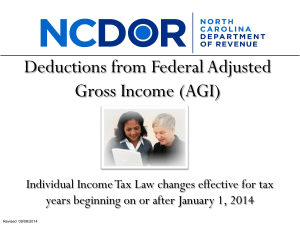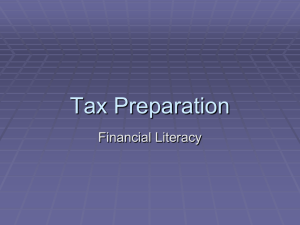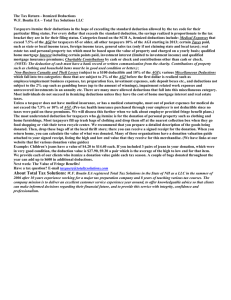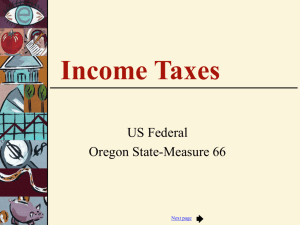no change from current law
advertisement
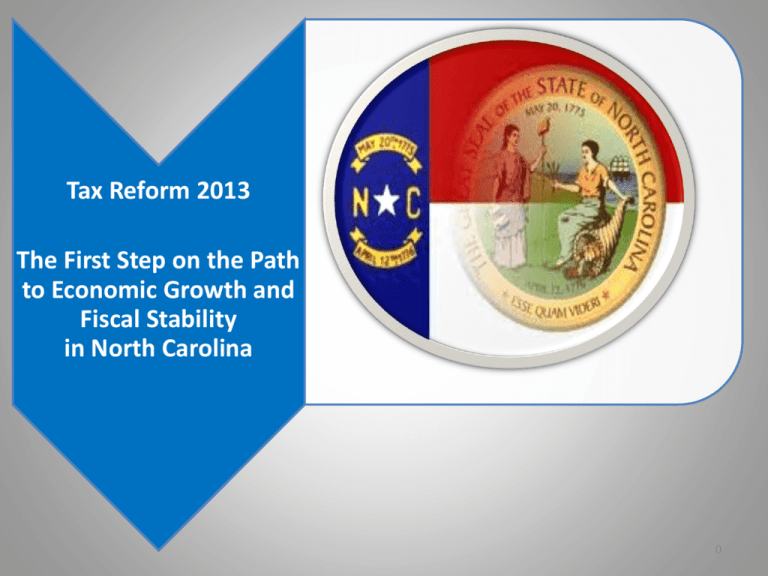
Tax Reform 2013 The First Step on the Path to Economic Growth and Fiscal Stability in North Carolina 0 Why Do We Need Tax Reform in North Carolina? 1 A Surprising Statistic Despite being one of the “Best Business Climates” in the U.S. during the last decade according to Site Selection Magazine & other publications, in NC: Job creation is not keeping up with workforce growth Job growth, unemployment, & poverty is worse than the U.S. average From 1990 to 2000, we were 11th in U.S. wage and income growth; In 2009, North Carolina was 45th In 2010, we were 48th 2 Economic Success---and Failure NC Per Capita Income as a % of US Average Has Been Decreasing Since 1997 95 1997: 92.88 93 91 1989: 89.08 89 2009: 87.62 87 2011: 86.7 85 1973: 83.14 83 81 79 1982: 81.44 1969: 79.14 77 75 1969 1972 1975 1978 1981 1984 1987 1990 1993 1996 1999 2002 2005 UNC Center for Competitive Economies 3 NC MEDIAN HOUSEHOLD INCOME HAS DECLINED EVERY YEAR SINCE 2000 10.9 % DECLINE SINCE 2000 Source: U.S. Census Bureau cited in Raleigh News & Observer Article in February, 2013 NC Economic Development Spending (Cumulative) $6,725,966,540 $7,000,000,000 $6,000,000,000 $5,402,783,885 $5,000,000,000 $4,180,679,410 $4,000,000,000 $2,917,405,768 $3,000,000,000 $1,616,170,002 $2,000,000,000 $378,340,914 $203,437,950 $1,000,000,000 $0 FY 03-04 FY 04-05 FY 05-06 FY 06-07 FY 07-08 FY 08-09 FY 09-10 Slide 5 NC Job Creation Performance 2000-2010 Job growth has lagged behind workforce growth for at least 12 years Slide 6 1970 1980 1990 2000 2010 Manufacturing 35.2% 32.7% 25.5% 18.8% 10.8% Government (incl. Military) 21.1% 19.6% 18.5% 18.1% 21.1% Trade, Transportation and Utilities 18.5% 18.1% 19.6% 18.7% 17.8% Services 14.9% 19.2% 25.2% 32.0% 39.1% Financial Activities & Information 5.4% 5.5% 5.8% 6.5% 6.7% Construction, Agriculture & Mining 5.0% 4.9% 5.4% 5.9% 4.5% Shrinking Sales Tax Base • The sales tax base has narrowed significantly over 40 years The bar graphs below indicate how North Carolinians spend $100 of their income as a % of items subject to sales tax We spend a smaller % of our income on items subject to sales tax now than in the 1970’s & more on services not subject to sales tax 8 Sales Tax Base Erosion From Presentation by Economist Michael Mazerov to Senate Finance Committee in 2009 9 State Tax Structure FY 1970-71 FY 2011-2012 10 Overreliance on Unstable Income Taxes for State Revenues 20% of General Fund revenue comes from these two volatile 11 sources. Why Tax Reform Was (Is) Needed • Pitiful job growth & increasing poverty in NC • Steadily decreasing per capita income and median household income • Major changes in how NC economy functions • Steadily shrinking sales tax base • Increasing reliance on volatile income taxes • Increasing budget deficits • Unsuccessful economic incentive programs • Overly complex and confusing tax statutes 12 Suggestions to Senate Finance Committee by Four Independent Experts on 6/11/13 • North Carolina’s current tax code is outdated and unsuitable for our changing economy • Economic incentives have not produced jobs • Need lower income tax rates (especially corporate) & broaden sales tax base to more services • Reduce sales taxes on B2B transactions • Tax reform alone is not enough but is necessary for job and income growth 13 TAX SIMPLIFICATION AND REDUCTION STATUTES House Bill 998, S.L. 2013-316 House Bill 112, S.L. 2013-363 House Bill 14, S.L. 2013-414 The Most Sweeping Changes to NC’s Tax Code in Many Years Basic Components of Tax Law Changes PIT CIT Estate Tax Sales Electricity Piped Gas Motor Fuel Tax Cap Personal Income Tax • Flat rate v. current rate brackets – 2013 = 6%, 7%, and 7.75% (Current rates) – 2014 = 5.8% – 2015 and thereafter = 5.75% • Enhanced child credit – $125 per child if AGI < $40,000 (new) – $100 per child if AGI < $100,000 (current law) • Eliminate personal exemptions – One per taxpayer and dependents – Current amounts: • $2,000 • $2,500 if AGI < $100,000 • Increase standard deduction to $15,000 (MFJ) – $6,000 (MJF) (Current amount) Personal Income Tax Changes – Itemized Deductions • Currently, all federal itemized deductions allowed • Effective 2014, only two deductions Home mortgage + property taxes paid on real estate allowed on federal return • Capped at $20,000 Charitable contributions allowed on federal return Other federal deductions eliminated • • • • Medical expense deduction Unreimbursed employee expenses Miscellaneous deductions Personal property taxes Items Eliminated No fewer than 40 tax exemptions, deductions, credits, or refunds were eliminated or allowed to sunset as provided Broadens the tax base Simplifies the tax code Eases compliance and administration Personal Income Tax Items that will Expire • Credit for premiums paid on long-term care insurance • Earned income tax credit • Credit for adoption related expenses Personal Income Tax Items that were Repealed • Personal exemptions • Tax Credits – Child care expenses – Disabled – Property taxes paid on farm machinery – Education expenses – Non-itemizer charitable contributions Personal Income Tax Items that were Repealed • Deductions from income – Retirement income – Severance wages – $50,000 business income deduction – Many itemized deductions – Parental savings trust fund – Firefighter & rescue squad – Payment for erroneous conviction Corporate Income Tax Changes • Reduce flat rate of 6.9% – 2014 = 6% – 2015 = 5% • Trigger for possible future rate reduction – 2016 = 5% or 4% – 2017 = 5% or 4% or 3% • Triggers – FY14-15 GF revenues =/> $20.2 billion – FY15-16 GF revenues =/> $20.975 billion Corporate Income Tax Items that will Expire • Credit for manufacturing cigarettes for exportation (2018) Items that were Repealed • Deduction for certain telephone subscriber fees • Deduction for savings & loan supervisory fees Personal & Corporate Income Tax Tax Credits that will Expire • • • • • • • • • • • • Ports charges Recycling oyster shells Renewable fuels Work opportunity Interactive digital media Article 3J Qualified business venture Film (2015) Renewable energy (2016) Historic & mill rehab (2015) Low income housing (2015) Railroad intermodal (2038) Tax Credits Repealed • Construction of dwelling units for handicapped • Real property donations • Conservation tillage equipment • Gleaned crops • Construction of poultry composting facility Tax Preferences Retained • Personal Income Tax – Deduction for all social security income – Deduction for “Bailey” retirement income – Child credit – Standard deduction • Corporate Income Tax – Credit for research and development (2016) – Credit for investing in a major recycling facility (no change from current law) SALES TAX CHANGES • • • • • Rate changes Additions to the sales tax base Elimination of exemptions Sales tax refunds Various effective dates Rates • No change in the State tax rate of 4.75% • No change in the local tax rates of 2% to 2.25% (Mecklenburg rate of 2.5%) • Manufactured homes – Currently 2% with $300 cap – State rate of 4.75%, effective January 1, 2014 – No local tax • Modular homes – Currently 2.5% – State rate of 4.75%, effective January 1, 2014 – No local tax Sales Tax Base Expansion • Amusements – – – – January 1, 2014 Live events Movies Attractions for which admission charged • Exemptions – School events – Nonprofit events (2) – Agricultural fairs – Youth sporting events – State attractions • Service contracts – January 1, 2014 – Agreement by which seller agrees to maintain or repair tangible personal property (TPP) – Not labor • Exemptions – TPP exempt from sales tax, except motor vehicles – Items used to fulfill service contract – Asset on utility owned property – TPP sold to motorsports for which a sales tax refund is allowed (S.L. 2013-414) Eliminate Sales Tax Exemptions Repealed January 1, 2014 • Nutritional supplements sold by chiropractors • Meals sold in higher educational facilities • Newspapers Repealed July 1, 2014 • Bakery thrift store • Sales tax holiday for school • Sales tax holiday for certain energy star products Other Sales Tax Changes • Exemptions for farmers – Annual gross income requirement from farming activity of $10,000 – Effective July 1, 2014 • Tax refunds for nonprofits – Cap at $45 million State and local (~ $666 million of purchases) – Effective July 1, 2014 • No change to tax refunds for local governments • Extend sunsets for passenger air carriers & motorsports for two years, January 1, 2016 ELECTRICITY & PIPED NATURAL GAS Effective July 1, 2014 Electricity Current Law • 3.22% franchise tax – Embedded in electricity rates – Subject to local distribution • Sales tax – 3% residential – 2.83% for dry cleaners – 0% for manufacturers & farmers & datacenters Effective July 1, 2014 • Eliminate franchise tax – Utilities Commission directed to change rates accordingly • Increase sales tax rate – State rate only – General combined rate of 7% – Local distribution formula – Retain current exemptions Piped Natural Gas Current law • Exempt from sales tax – Embedded in utility rates – Subject to local distribution • Excise tax on a per therm basis • Exemptions for manufacturers, farmers, and datacenters Effective July 1, 2014 • Eliminate excise tax – Utilities Commission directed to change rates accordingly • Subject to sales tax – State rate only – General combined rate of 7% – Local distribution formula – Retain current exemptions ESTATE TAX • House Bill 101 eliminates estate tax • Effective for decedents dying on or after January 1, 2013 • Reduces General Fund revenues by ~ $52 million MOTOR FUEL TAX Caps tax rate at 37.5 cents per gallon Effective October 1, 2013, through June 30, 2015 House Bill 966; SCS for House Bill 998 What is the Price of Inaction? • The long term costs of failure to continue with major, meaningful tax reform are obvious from the economic information presented—continued decrease in personal income, increasing poverty, budget deficits, unemployment, etc. • Everyone agrees the current tax code is antiquated and simply not adequate for NC’s new economy---- it MUST be changed Follow-up Questions-Comments-Suggestions robert.rucho@ncleg.net 919-733-5655 michael.hannah@ncleg.net 919-715-8348 37


